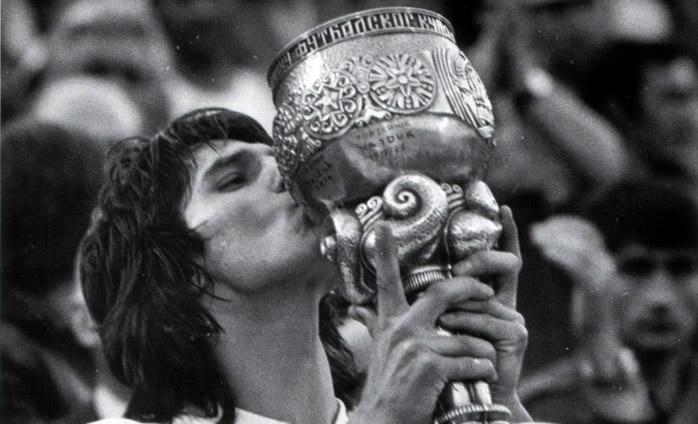Happy 105th birthday Hajduk!
This Saturday, February 13, 2016, Hajduk will celebrate its 105th birthday marking the day when a permit was issued by the Imperial Governor in Zadar and the club was officially founded. Since the story of Hajduk is anything but a typical one, and knowing that supporting this football club is a way of life and almost a religion in Dalmatia, Total Croatia News’ Goran Antonijević is bringing 105 facts about Hajduk, a 5 article series for fans around the globe. Let’s start with today’s 21 facts, and don’t forget – Hajduk živi vječno (Long live Hajduk)!
- Fabjan Kaliterna (1886-1952) is the founder of Hajduk, and he is also considered to be the founding father of organized sport in Split. He co-founded Hajduk with Vjekoslav Ivanišević (1884-1955), Lucijan Stella (1881-1968), Ivan Šakić (1885-1971) and Vladimir Šore (1880-1965). In the very famous and very true story, these 5 students that were studying in Prague at the time got together in the renowned U Fleku pub after watching a football match against Slavia and Sparta and decided to establish a football club which would be “The best in the world and its surroundings”.

- The “godfather” behind Hajduk’s name was Professor Josip Barač (1871-1939). He suggested the name Hajduk after the club founders stormed into his office like Hajduks (rebels). According to Barač, name Hajduk symbolizes heroism, fraternity, love of freedom, defiance to oppressors, and the protection of the weak.
- The first goal in Hajduk’s history was scored by Šime Raunig, on June 11th, 1911, in a match against Sezione Calcio Edera, a local club of Italian origins from Split. The goal was scored in a peculiar way: volleying knee shot. Hajduk won that game 9-0.

- Frane Matošić (739), Ivica Hlevnjak (665) and Slavko Luštica (634) are the players with most caps for Hajduk in club’s history.
- Best scorers in Hajduk’s history are Frane Matošić (729) Leo Lemešić (455) and Ljubomir Benčić (355).
- The most successful coaches are Tomislav Ivić (6 titles), Ivan Katalinić (4), Luka Kaliterna (3), Ljubo Benčić (3) and Petar Nadoveza (3).
- Hajduk players with most national team caps are Darijo Srna (127), Stipe Pletikosa (114) and Robert Jarni (88). Curiosity: in 1924, 10 Hajduk players started the national team game for Yugoslavia vs. Czechoslovakia, and the only reason Hajduk’s goalie Otmar Gazzari was not in the team was very simple: he only had Italian citizenship even though he was of Croatian descent.
- Hajduk was declared the Honorary Team of Free France by general and future President of France Charles De Gaulle in 1945, because of its participation and contribution in antifascist battle during WWII.

- Hajduk was worthy of its name on more than few occasions; it refused to join the Austrian football federation shortly after it was founded (Split was under Austro – Hungarian rule at the time), as Austrian ultimatum to stop playing with Czechoslovakian teams was turned down, Hajduk refused to play in Italian Serie A during the Italian occupation of Split in WWII and joined Partisan army instead. After the war, it refused the Jugoslav Army offer to become the official Army team and move to Belgrade, and refused to play in a game in Zagreb a few years ago when its fans were banned from the stadium for no legal reason.
- Hajduk has its own operetta, “Kraljica lopte” (The queen of the ball), composed by the famous Croatian composer Ivo Tijardović. One of the most popular Croatian TV-series, “Velo misto” (A big town) is dedicated to Hajduk, and it is a tale of both Split and Hajduk history.
- No football club in the world has more songs dedicated to it than Hajduk.
- Torcida, founded in 1950, is the oldest organized football supporters group in Europe. Since the World Cup was going on in Brasil at the time of their founding, Split students in Zagreb wanted to emulate the loud Brasilian football fans and that’s where Torcida got its name. Just one day after the founding, new Torcida members travelled to Split by train in large numbers and played a big part in a win against Hajduk’s rivals from Belgrade, Red Star (Crvena Zvezda). This win was crucial for Hajduk’s first championship title after WWII.
- Hajduk played on 5 continents, Antarctic yet to be conquered. No Hajduk game in history was played with Hajduk fans not attending. Even when banned from the games, some of them found a way to appear on the bleachers or cheered in front of the stadium. https://www.youtube.com/watch?v=FmJFKX6zy00
- Hajduk team colours are white and blue, white shirts and blue shorts symbolizing white sails on the blue sea. Original Hajduk flag was red and blue, with word Hajduk written in the middle, as a symbol of the Croatian flag, being banished by the authorities in Austria, ruling Dalmatia in days when Hajduk was founded.

- Hajduk has won 18 National Championship titles and 15 National Cup titles. Hajduk has never been relegated.
- Hajduk is the only team to win a Championship title in Yugoslavia without losing a single game in the championship.

- Hajduk reached quarterfinals competing in the Champions league (European Champions Cup) on three occasions; in 1976, 1980 and 1995.
- Hajduk reached the semi-final stage of the Cup Winners Cup 1973, and quarterfinals in 1978.
- Playing in the UEFA Cup, Hajduk has reached one semi-final (1984) and one quarterfinal (1986).

- In its international history, Hajduk played 166 games, winning 71, losing 63 and drawing 32. Goal difference is 241-198.
- Hajduk plays its home games at Poljud stadium, venue declared a protected cultural heritage in November 2015. Hajduk moved here in 1979, leaving legendary “Stari Plac” stadium where its story began.










